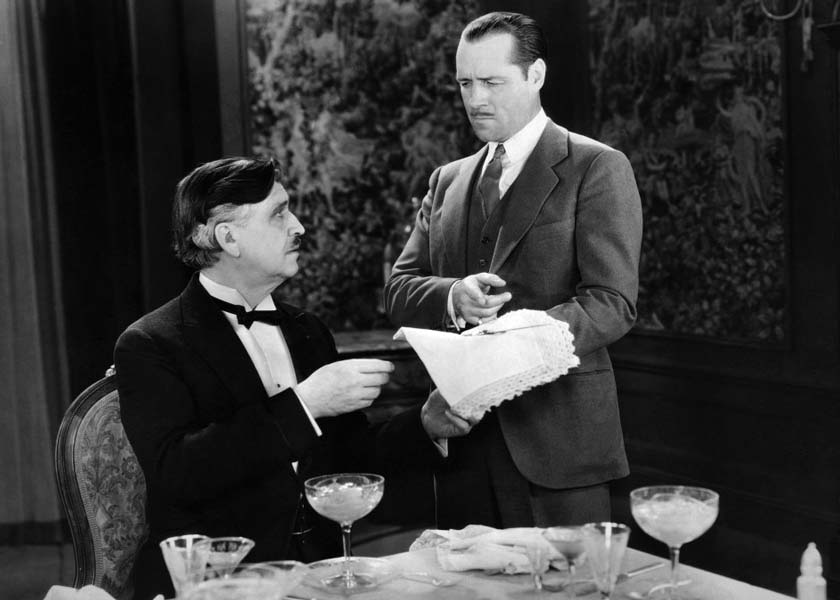Synopsis
Jack Donovan (Roche), a caddish playboy, attends a dinner party given at the home of Peter (Alphonse Ethier) and Lydia Rankin (Ayres). Several people at the party despise Donovan. During dinner the lights are turned off (to demonstrate the glow of Donovan’s ring). Donovan is stabbed to death in the darkness.
Inspector Killian (Holt) and his brainless assistant Carney (Fred Kelsey) investigate the murder. After Killian questions the guests and the servants, everybody reassembles around the dinner table, and the lights are turned off to reenact the crime. Porter (Wheeler Oakman) realizes he can identify the murderer but is stabbed before he can speak the name. Killian makes more attempts to force the murderer into revealing himself. The guests assemble around the table once again; the lights are turned off, and Cornish (Collier, Jr.), fiancéé of Jean Rankin (Revier), claims to know the murder’s identity. When the murderer tries to stab Cornish, Killian captures him. The murderer turns out to be the Nelson (Edward Hearn), the butler, madly jealous of Donovan’s attentions to his maid, Mary (Virginia Brown Faire).
Discussion
The Donovan Affair, director Frank Capra’s first talkie, is a comic mystery containing abundant clichés: wind, rain and lightning effects, murder in the dark, a dim-witted assistant detective, harebrained dinner guests, and re-enactments of the crime. The mildly amusing scenario is replete with trite and inane elements such as a murder victim overplayed as a cad with a magic glowing ring that makes women fall for him, slow-witted police detectives, a preposterous method of solving the murder, and a murderous butler, instantly changing from quietly friendly to violently insane.
In 1929, Capra was at the beginning of ten years of great filmmaking. The most important talent at Columbia Pictures, Capra put himself and his studio in the first rank of filmdom with Lady for a Day (1933), which was nominated for four Academy Awards. It Happened One Night (1934) won five Academy Awards, including Best Picture and Best Director, and shot Capra to the heights, where he remained until his last film in 1961.
After entering films in 1914 at age 26, Jack Holt’s first significant part was as costar to Mary Pickford in The Little American (1917). Holt starred in numerous silent and talkie Westerns, including an extensive series based on the novels of Zane Grey. He made four films with Frank Capra, three of them — Submarine (1928), Flight (1929), and Dirigible (1931) — costarring Ralph Graves in stories about buddies who serve on a military vehicle and love the same woman. Invariably, Holt loses the woman but, nevertheless, saves Graves after the vehicle crashes. Holt’s appearance was distinctive; everything about him was square, from his upright stance with straight back and squared shoulders to his granite jaw. His sober demeanor and deep, gravelly voice contributed greatly to the sense of single-minded purpose conveyed by his screen persona.
William Buster
Collier, Jr., entered films at age twelve in
The Bugle Calls (1914), starring his father William Collier, Sr.
During the 1920s, Collier, Jr., a youthful romantic actor, starred in numerous
films. Although short, slightly slouchy, weak voiced, and lacking a forceful
screen presence, Collier continued in leading roles through the first half of the
1930s, his films gradually declining to B programmers. He made his final film in
1935. He remained in the movie business as an agent with the Wm. Morris Agency and
was an executive producer for several television series, including
Mr. & Mrs. North (1953) and
The Adventures of the Falcon (1954-56).
Agnes Ayres, a star in the late 1910s and early 1920s, Agnes Ayres is mostly remembered for her role as the kidnapped Englishwoman in The Sheik (1921), the film responsible for Rudolph Valentino’s status as the screen’s greatest lover. Ayres’ career was fading by the late 1920s; she continued in small roles until 1936 when she retired at age 38.
During his fifty-year career (478 acting credits from 1911 to 1961), Fred Kelsey
specialized in dumb cops. His face and build typecast him as a policeman even in
the silent era when his raspy voice could not be heard. Carney
in
The Donovan Affair is basically the same character as
Dickens
in Warren William's Lone Wolf series (1940-43).
Although a complete picture copy of The Donovan Affair exists on film, the soundtrack, originally recorded onto Vitaphone phonograph discs, has been lost. Bruce Goldstein, repertory director at Film Forum in New York, has reconstructed the dialogue and sound effects for the film. Goldstein’s restored version has been presented using live voice actors and sound effects at the Turner Classic Movies Festival in 2013, and the San Francisco Silent Film Festival in 2015.
Further Reading

